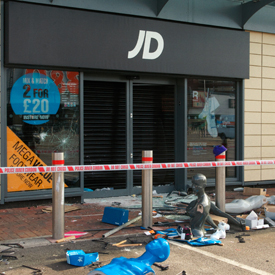Tackling the causes of the riots: ‘Are we brave enough’?
As the first person is charged for rioting last summer, a cross-party summit is held to tackle the potential causes. Channel 4 News speaks to a bereaved father who says the debate is too polarised.

The problem with the post-riot debate so far is that it has been too polarised and reactionary, says Barry Mizen, whose son Jimmy was killed in 2008 aged 16 while trying to avoid a fight.
David Lammy is the latest example – he said on Sunday that restrictions on parents smacking their children was partly to blame for last summers’ mass outbreak of rioting.
Mr Mizen, who helped set-up Families United and founded the Café of Good Hope in memory of his son, told Channel 4 News that he hopes today’s cross-party summit will kick-start meaningful political debate.
Politicians are trying to do everything at once. We need to get plans in place and look to come up with specifics. Are we brave enough to say – this is our target? Barry Mizen, founder of Families United
“For me, there is so much polarisation in the debate on young people,” he said. “But today is non-partisan. You’re not playing one party against the other as usually happens.”
His café in south east London is hosting no less than the Prince of Wales, along with the head of the Prince’s Trust and the Scouts Association, and a group of young people. Their concerns will then be taken to representatives from Labour, the Conservatives and Liberal Democrats, as part of an attempt to tackle youth unemployment and look at some of the causes of last year’s riots.
The riots – in numbers
90 per cent of rioters were male
£300m estimated damage to property
74 per cent of rioters: under 25
90 per cent of those arrested were known to the police
Youngest arrested: 10-year-old
£43.5m cost of clean-up
First charge for rioting
Today’s summit – supported by the Prime Minister and leader of the Labour opposition – comes on the day that Scotland Yard have charged the first person with the offence of rioting last summer.
While many charges of burglary and damage to property have already been made, a rioting charge can only be upheld if prosecutors prove that 12 or more people together threatened unlawful violence that causes people to fear for their safety. The maximum sentence is 10 years in prison.
However for Mr Mizen, the lengthy sentences against those involved in the riots are part of the problem, not the solution. “I don’t believe that these ever harsher punishment acts as a deterrent – I do believe that politicians almost get pressurised to act this way,” he told Channel 4 News.
“We’ve got this general idea that the way to do it is through retribution. Yes we can put the next criminals in prison. Why focus on that only? We’re looking in the wrong direction, and not looking at prevention.”

Could the riots happen again?
The riots brought a huge number of underlying issues to the fore: rising unemployment, gangs, role models, family breakdown, anti-social behaviour, community upheaval, welfare needs – the list goes on.
Addressing any one of these is complicated, but experts are warning of consequences if we don’t: Camila Batmanghelidjh, the highly respected founder of youth charity, Kids Company, has said that the riots were a warning of what is to come.
And so have the Riots Communities and Victims Panel. The panel’s final report will be presented to government in March, but in their interim report, 5 Days in August, they record young people and experts saying this could happen again.
“That’s what people told us,” Darra Singh, one of the four panel members, told Channel 4 News. “The riots were unprecedented, in terms of the speed in which they developed and spread. But the conditions and underlying causes are fundamental. We need to start to address some of those.”
‘Hopes and dreams’
During the panel’s research, youth unemployment, now at a record high of 20.3 per cent, came up as a major concern of young people and those involved in the riots.
“One of the young people we spoke to said to me; ‘I can’t really see where my hopes and dreams are going to take me’,” Mr Singh told Channel 4 News.
Community breakdown is also an issue: 70 per cent of the rioters are from the 30 per cent most deprived areas of England. And many voluntary organisations have called for a joined up approach to dealing with these problems.
“One statistic we haven’t heard enough about is that one third of all those 10-17 year olds arrested in the riots had been permanently excluded from school in the last year,” Gracia McGrath, chief executive of Chance UK wrote on the New Philanthropy Capital blog. ” In the 6 months since the summer riots Chance UK have been asked 1000 times what the causes were, but only 3 times what solutions there are.”
The Riots and Communities Panel are now looking at how to respond to the issues raised, but Mr Singh said that they will be looking for solutions at every level: from families, to schools, to communities and to society as a whole.
But as Mr Mizen told Channel 4 News, it will take time to address the underlying problems that the riots have highlighted. He hopes that today’s summit will help contribute to meaningful political debate on an issue that touches on all parts of society.
“They’re [politicians are] trying to do everything at once,” he says. “We need to get plans in place and look to come up with specifics. Are we brave enough to say – this is our target?”




